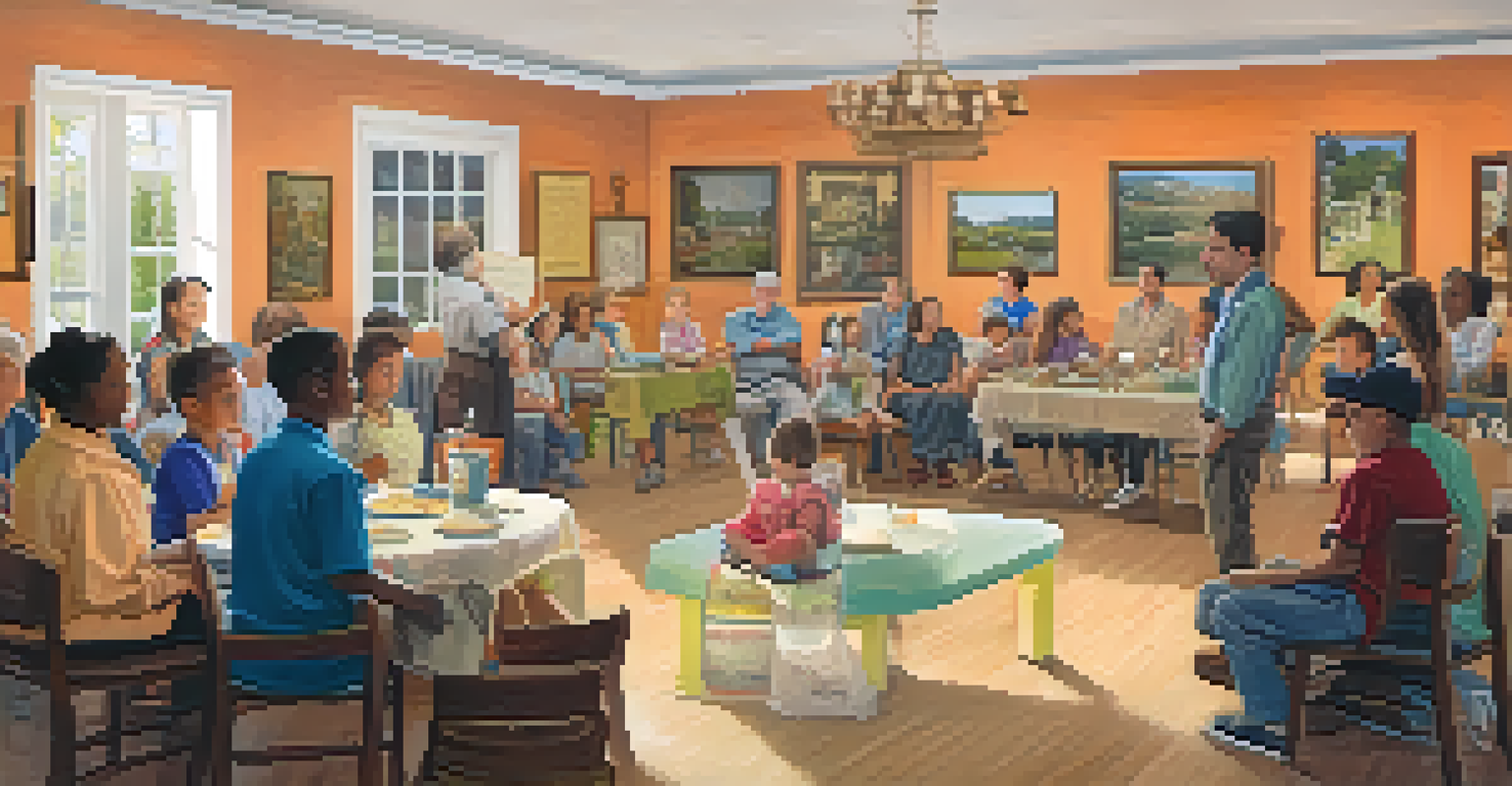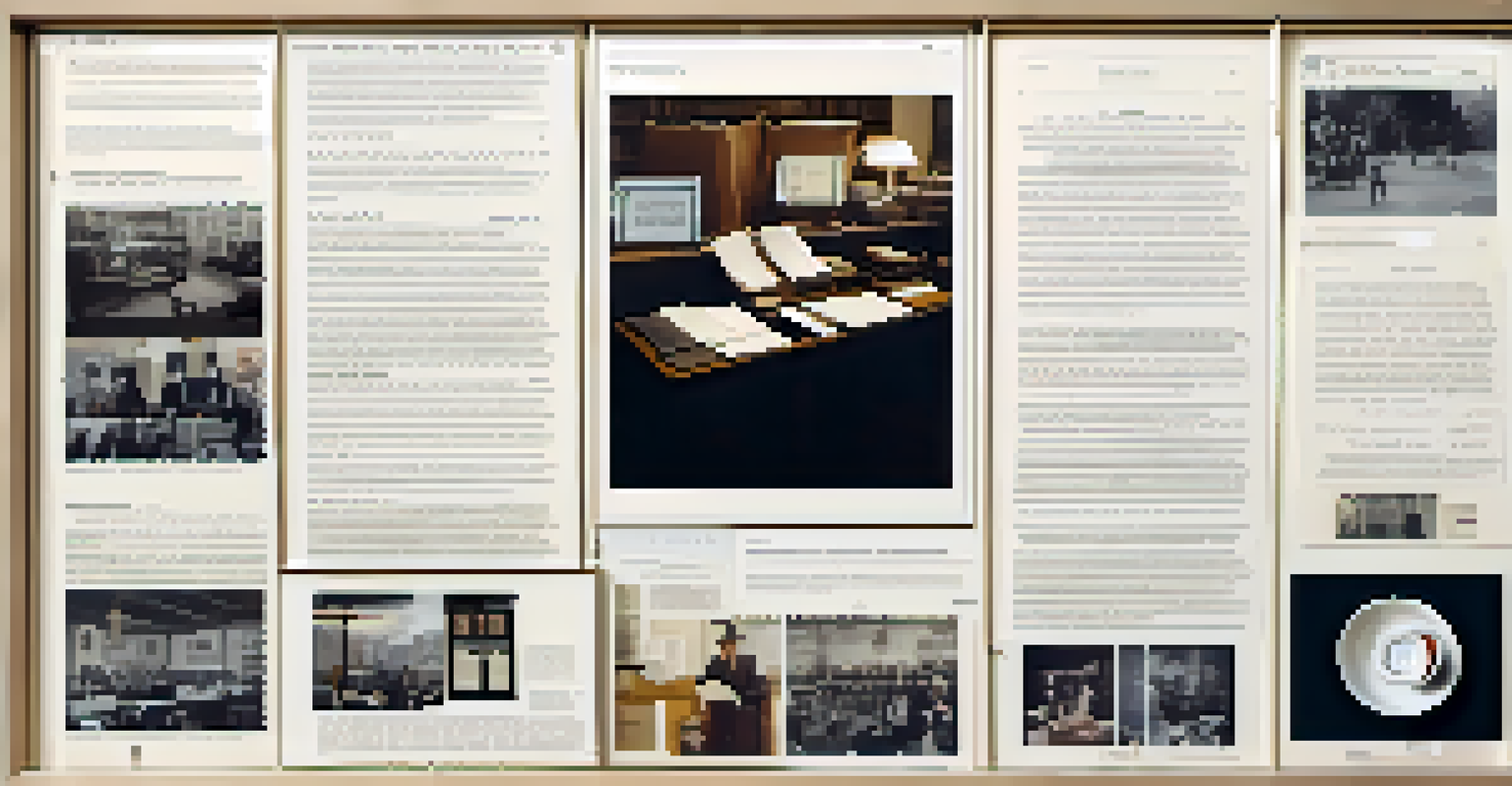Exploring Pasadena's Rich Historical Archives and Research Libraries

The Treasure Trove of Pasadena's Historical Archives
Pasadena is a city that exudes charm and history, and its archives are a testament to that. With a wealth of documents, photographs, and artifacts, these collections tell the story of the city’s evolution. From the early days of its founding in the 1800s to the vibrant community it is today, the archives serve as a window into the past.
History is who we are and why we are the way we are.
Visitors can explore various historical documents, including city records, personal letters, and even newspaper clippings that paint a vivid picture of life in Pasadena over the years. These resources are invaluable for researchers, students, or anyone simply curious about the city's heritage. Each document has a story to tell, contributing to a greater understanding of the community's roots.
Moreover, the archives often host events and exhibitions, allowing the public to engage with Pasadena's history in dynamic ways. By diving into these collections, you not only learn about the past but also connect with the present and future of Pasadena.
Key Research Libraries to Explore in Pasadena
Pasadena is home to several premier research libraries that cater to a variety of interests. The Pasadena Public Library, for instance, offers a vast collection of books and resources, alongside archives that showcase local history. This library isn’t just for book lovers; it’s a hub for community events and educational programs, making history accessible to everyone.

Another notable gem is the California Institute of Technology's (Caltech) library, which not only serves its students but also opens its doors to the public for research purposes. The collections here are particularly strong in science and engineering, reflecting Caltech’s prestigious reputation. For those interested in technical history, visiting this library can be an enlightening experience.
Pasadena's Archives Preserve History
The historical archives in Pasadena offer a wealth of documents and artifacts that narrate the city's rich and evolving story.
Additionally, the Pasadena Museum of History features a research library that specializes in documents and materials related to the San Gabriel Valley. Here, researchers can dive deep into local history and gain insights that are often overlooked in broader studies. Each library contributes uniquely to the rich tapestry of Pasadena's historical narrative.
Utilizing Digital Archives for Research
In our digital age, exploring history has never been easier, and Pasadena's archives are no exception. Many institutions have digitized their collections, making it accessible for anyone to explore from the comfort of their home. This shift to digital resources not only broadens access but also enhances the research experience, allowing users to search for specific documents or topics with ease.
The past is not dead; it is not even past.
For instance, the Pasadena Public Library's website offers online access to various historical documents and photographs. By using keywords, researchers can find relevant materials quickly, saving time and effort. This convenience has opened up new avenues for both casual historians and serious researchers alike.
Moreover, digital archives often include interactive elements, such as virtual tours or online exhibits, which make learning about history more engaging. This integration of technology into historical research encourages a younger audience to delve into the past and fosters a greater appreciation for the city's rich history.
Events and Workshops at Historical Archives
One of the best ways to connect with Pasadena's historical archives is through the events and workshops they offer. These activities range from guided tours of the archives to hands-on workshops where participants can learn about archival research methods. Such events not only provide valuable knowledge but also foster community engagement.
For example, the Pasadena Museum of History frequently organizes family-friendly events that delve into local history, making it fun for all ages. Engaging with history through activities like storytelling sessions or artifact handling helps bring the past to life. It creates memorable experiences that resonate with attendees long after they leave.
Digital Access Enhances Research
The shift to digital archives makes Pasadena's historical resources more accessible, allowing for easier exploration and research from anywhere.
Additionally, many archives collaborate with local historians and experts to host lectures and panel discussions. These events can deepen understanding of specific topics and encourage dialogue within the community. Participating in these gatherings not only enhances one’s knowledge but also connects individuals with others who share a passion for history.
The Role of Local Historians in Preserving History
Local historians play a crucial role in maintaining and interpreting Pasadena's rich historical narrative. They often conduct research and collect stories that might otherwise be lost to time. By documenting personal histories and oral traditions, they add depth to the archives, ensuring that diverse voices are included in the historical record.
These historians often collaborate with libraries and archives to curate exhibits or publish findings that highlight specific aspects of Pasadena's past. Their work helps to illuminate lesser-known stories and encourages a more comprehensive understanding of the city’s history. This collaboration enriches the resources available to researchers and the community.
Moreover, local historians frequently engage with the community through talks and workshops, sharing their insights and findings. By fostering a connection between the past and present, they inspire others to take an interest in their local heritage. This passion for history is contagious and helps ensure that Pasadena's rich legacy is preserved for future generations.
Engaging with the Community through History
Engaging with the community is a vital aspect of Pasadena's historical archives. Many institutions strive to connect with residents by offering programs that promote local history and culture. These initiatives not only educate but also empower individuals to take pride in their heritage, fostering a sense of belonging.
Programs such as community storytelling events or local history fairs invite residents to share their experiences and memories. This participatory approach creates a living history that goes beyond the documents and artifacts found in archives. It encourages people to explore their own connections to the past and discover the impact of history on their lives.
Community Engagement with History
Events and programs at historical archives foster community involvement, encouraging residents to connect with and celebrate their local heritage.
Furthermore, outreach efforts often target schools and educational institutions, introducing students to local history. By creating engaging materials and activities, archives inspire the next generation to appreciate and preserve their community’s legacy. This ongoing dialogue between the archives and the community ensures that history remains relevant and accessible.
Future of Historical Research in Pasadena
As technology continues to evolve, so does the future of historical research in Pasadena. With advancements in digital archiving, researchers will have even more access to valuable resources, enhancing their ability to study the past. This shift not only makes research more efficient but also encourages innovative approaches to understanding history.
The integration of artificial intelligence and machine learning may also play a role in how archives are organized and accessed. These technologies could help researchers discover connections between various documents and highlight patterns that were previously unnoticed. This exciting potential can transform the way we engage with historical data.

Moreover, as more people become interested in genealogy and local history, archives will likely see an increase in visitors and researchers. This growing interest can lead to more funding and resources being allocated to preserve and expand collections. Ultimately, the future of historical research in Pasadena looks bright, with ample opportunities for exploration and discovery.